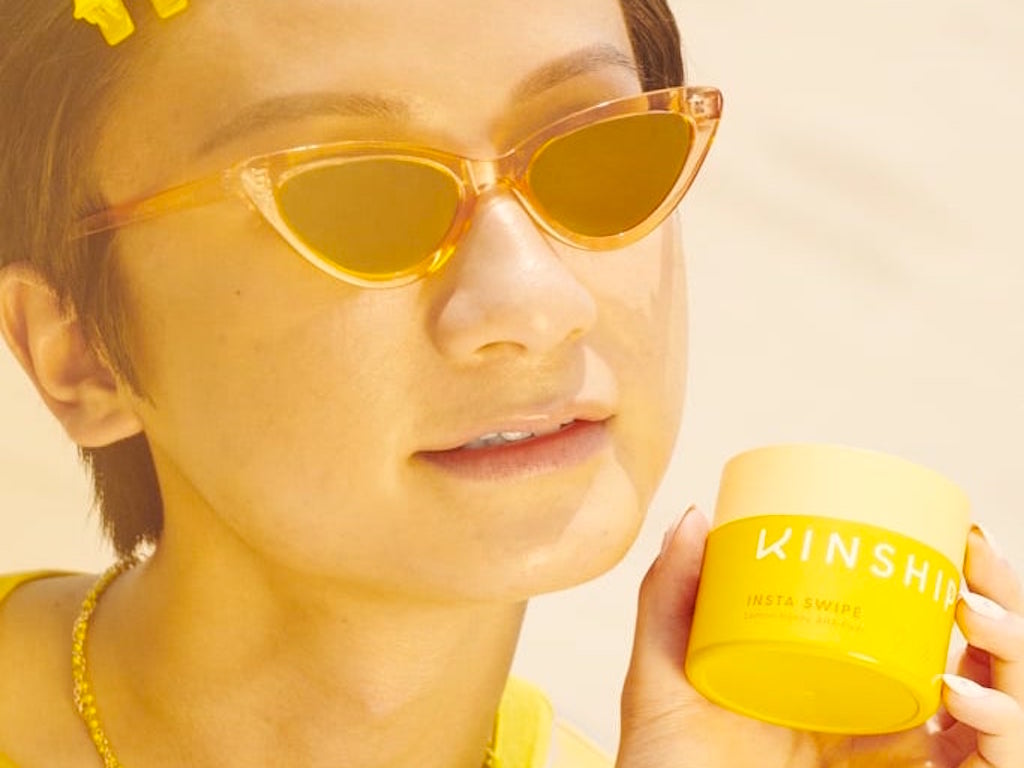3 Mins Read
In what appears to a world first, US brand Kinship has just launched a new skincare line with packaging made from traceable ocean plastic waste. In line with the global consumer trend demanding that businesses offer products that consist of non-toxic ingredient lists, eco-friendly packaging and vegan and cruelty-free ingredients, Kinship appears to be ticking all the boxes.
Kinship was founded by two veterans in the beauty and cosmetics industry, the former vice president of marketing at Benefit Cosmetics Alison Haljun and co-founder of Juice Beauty Christin Powell. The star ingredient in every Kinship skincare product – which are Leaping Bunny certified cruelty-free – is Kinbiome complex, a plant-based prebiotic derived from the fermentation of lactobacillus. This blend is said to promote the natural balance of your skin’s microbiome and barrier.
Other than their key prebiotic ingredient, the brand is committed to a minimal number of ingredients, and is transparent about all their products having no GMOs, parabens, sulfates, SLS, phthalates, silicones, alcohols and other synthetic fragrances.
However, in the midst of a whole wave of natural, organic, plant-based and cruelty-free beauty products popping up in the market, Kinship offers exciting innovation in the world of sustainability: eco-friendly packaging made from ocean plastic waste. In addition to their entire line of products being packaged in fully recyclable tubes made from post-consumer recycled materials and shipped in FSC-certified recycled paper boxes, two of their products – Supermello and Insta Swipe – are contained in jars made from Ocean Plastic Waste (OWP).
What’s more: there is a QR code on each product, which can be scanned using any smartphone to tell consumers exactly where and when the plastic was harvested. The majority of the ocean plastic used to make Kinship’s packaging is sourced from waste found in rivers located in Indonesia.
READ: AI Powered Tree Management System Jejak To Help Clean World’s Most Polluted River
“It’s a great way to bring the problem into our consciousness. For us as responsible founders, there was no way we couldn’t actually build that level of sustainability from the beginning. We hope to encourage many other brands in the industry to also use ocean waste,” said co-founders Powell and Haljun.
Traceability is becoming an important differentiator for companies in the sustainable world. Hong Kong’s preloved luxury fashion initiative, LUXARITY, for instance, recently partnered up with global blockchain platform Lablaco to enable traceability to the secondhand fashion shopping experience. Through the scan of a QR code, users can find out where the preloved item had been worn, the environmental impact of the garment, and read a personalised note from the previous owner.
These sustainability-oriented moves comes as consumers – especially the younger generation of millennials, Gen-Zs and Alphas – are becoming increasingly attuned to the footprint of their consumption habits. Responding to the eco-conscious demographic who have popularised clean beauty, mainstream and indie brands alike are making more active steps to green their brands.
This year at the NOA 2019 trade show in Hong Kong, for instance, more natural and organic beauty, personal care and wellness companies were showcasing sustainable and minimal packaging designs. Global beauty and cosmetics giant Sephora have also launched their “Clean” beauty category this year, featuring only toxin-and-synthetic-free labels using more eco-forward packaging solutions.
Perhaps the most ahead of the game in the industry is British cult beauty brand LUSH, who introduced their “carbon positive” cork packaging solution earlier this year as well as debuting their naked store concept in Asia. Using regeneratively grown cork harvested in Portugal, these cork containers contribute to absorbing carbon from the atmosphere and are transported emissions-free through sailboats. Following in line are other global brands such as Birkenstock, who are now expanding into skincare, revealing their line of refillable cork bottles for packaging.
Lead image courtesy of Kinship.




